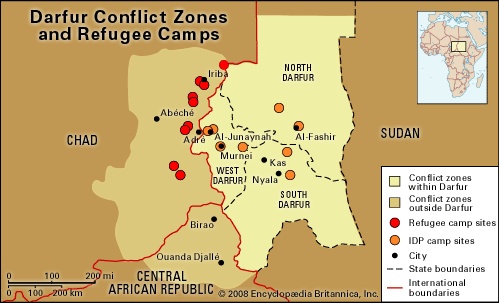Bashir, Omar Hassan Ahmad al-
president of The Sudan
born Jan. 7, 1944, Hosh Wad Banaqa, Sudan
Sudanese military officer who led a revolt that overthrew the elected government of The Sudan (Sudan, The) in 1989. He served as president of The Sudan from 1993.
Bashir was born into a peasant family that later moved to Khartoum, where he received his secondary education; he then joined the army. He studied at a military college in Cairo and fought in 1973 with the Egyptian army against Israel. Returning to The Sudan, he achieved rapid promotion, and in the mid-1980s he took the leading role in the Sudanese army's campaign against the rebels of the southern Sudan Peoples' Liberation Army (SPLA).
Bashir, frustrated with the country's leadership, led a successful coup in 1989. He became chairman of the Revolutionary Command Council for National Salvation, which ruled the country. Bashir dissolved the parliament, banned political parties, and strictly controlled the press. He was supported by Hassan al-Turabi, a Muslim extremist and leader of the National Islamic Front (NIF). Together they began to Islamize the country, and in March 1991 Islamic law ( Sharīʿah) was introduced. This move further emphasized the division between the north and the mainly animist and Christian south.
In October 1993 the Revolutionary Council was disbanded, and Bashir was appointed president of The Sudan; he retained military rule, however. He was confirmed as president by an election held in 1996. Bashir's ally Turabi was unanimously elected president of the National Assembly. On June 30, 1998, Bashir signed a new constitution, which lifted the ban on political parties. In December of that year, however, he used military force to oust Turabi, who, he believed, was plotting against him. On March 12, 2000, Bashir declared a three-month state of emergency, which, by stages, he thereafter extended indefinitely. After the December 2000 elections in which he was once again confirmed as president, he dismissed the cabinet.
Throughout this period, war with the SPLA continued, displacing millions of southerners. From time to time Bashir made tentative cease-fire agreements with fringe elements of the rebel force, but, when oil production started on a large scale in the border area between north and south in 1998, the dispute grew fiercer. Under international pressure, Bashir agreed in 2005 to form a peace pact with the SPLA, but delays in the implementation of the agreement led to the withdrawal of southern members from the government on Oct. 11, 2007.
 Meanwhile, in August 2003, rebel black African groups in Darfur had launched an attack on Bashir's government, claiming unfair treatment. To combat the Darfur uprising, the president enlisted the aid of the Arab militia known as Janjaweed, whose brutal methods terrorized the civilians in the region, prevented international aid organizations from delivering much-needed food and medical supplies, and displaced more than two million people, earning harsh criticism from international commentators. As the Darfur conflict raged on, Bashir reluctantly accepted the arrival of a very small African Union (AU) peacekeeping force but resisted attempts by the United Nations (UN) to send a much larger international force. The AU peacekeeping mission was eventually replaced by a joint UN-AU mission that began deployment in 2008.
Meanwhile, in August 2003, rebel black African groups in Darfur had launched an attack on Bashir's government, claiming unfair treatment. To combat the Darfur uprising, the president enlisted the aid of the Arab militia known as Janjaweed, whose brutal methods terrorized the civilians in the region, prevented international aid organizations from delivering much-needed food and medical supplies, and displaced more than two million people, earning harsh criticism from international commentators. As the Darfur conflict raged on, Bashir reluctantly accepted the arrival of a very small African Union (AU) peacekeeping force but resisted attempts by the United Nations (UN) to send a much larger international force. The AU peacekeeping mission was eventually replaced by a joint UN-AU mission that began deployment in 2008.On July 14, 2008, the chief prosecutor of the International Criminal Court (ICC) called for an arrest warrant to be issued against Bashir. He was cited for crimes committed against humanity in Darfur. The Sudanese government, which was not a party to the treaty creating the ICC, denied the charges and proclaimed Bashir's innocence.
- Košice government
- Koželuch, Leopold
- Koƈu Bey
- Kpelle
- kraal
- Krabi
- Kraenzlein, Alvin
- Kraepelin, Emil
- Krafft-Ebing, Richard, Freiherr von
- Kraft, Adam
- Kraft Foods Inc.
- Kraft Hohenlohe-Ingelfingen, Prinz zu
- Kraft, Prinz zu Hohenlohe-Ingelfingen
- kraft process
- Kraftwerk
- Krag, Jens Otto
- Kragujevac
- Kra, Isthmus of
- krait
- Krakatoa
- Krak des Chevaliers
- kraken
- Kraków
- Kraljevo
- Krall, Diana